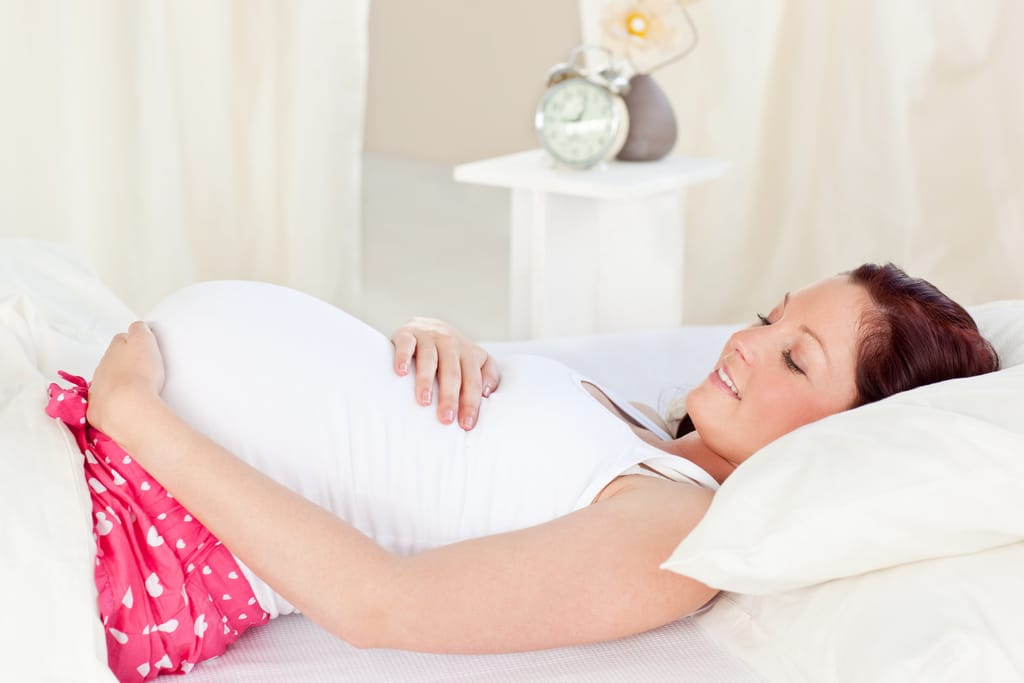How to sleep when pregnant?
Getting a good night’s sleep when pregnant can be a challenge, as it is difficult to find a comfortable position to sleep in. There are many physiological and psychological changes that happen during pregnancy that can make it hard to sleep. There are also several safety considerations to keep in mind.

Create a comfortable environment
For pregnant women, the sleeping environment is important for their well-being. It is especially important to ensure both the mother’s and baby’s health.
- If possible, invest in a supportive mattress: A firm, supportive sleeping surface is essential for pregnant women to ensure the spine and neck are properly aligned. Look for a mattress made of memory foam or latex, as they are the most supportive kind.
- Add a pillow between the legs: it helps ease pressure on the hips, back and spine.
- Use a body pillow: it helps to provide extra support for the back, hips, and stomach.
- Avoid sleeping on your back: rather, sleep on your side during pregnancy. Sleeping on your back can cause pressure on the spine and reduce blood flow to the uterus.
- Make sure the room is cool: excessive heat or noise can disturb your sleep. It is best to keep the room temperature between 60 and 65 degrees.
- Use a light, breathable bedding: this will help to keep the body cool and the sheets light.
- Avoid caffeine and large meals before bed: Eating a large meal before bed can cause discomfort and indigestion.
Bonus lifestyle tips
- Establish a consistent bedtime routine. Going to bed and waking up at the same time every day can help regulate your body’s internal clock and lead to better sleep.
- Exercise regularly. Moderate exercise during the day can reduce stress and make it easier to fall asleep at night.
- Create a comfortable sleep environment. Make sure your bedroom is a comfortable temperature, is dark and quiet, and has comfortable bedding.
- Avoid caffeine. Caffeine can interfere with sleep, so be sure to limit your intake of coffee, tea, and other caffeinated beverages.
- Avoid eating or drinking too close to bedtime.
- Take naps during the day if needed. Naps can be helpful in making up for lost sleep but avoid napping too close to bedtime.
- Avoid using electronic devices before bed. The blue light from electronic devices can interfere with your body’s production of melatonin, a hormone needed for sleep.
- Try relaxation techniques. Taking a hot bath, doing yoga, or meditating can help your body and mind relax and prepare for sleep.
- Talk to your doctor. If your sleep problems persist, talk to your doctor about treatments.
- Sleep when your baby sleeps. Although this isn’t always possible, taking advantage of your baby’s naps can be a great way to catch up on sleep.

The Benefits of Napping
Napping during pregnancy can provide a range of benefits for expecting mothers. This activity (if you can call it that way) promotes better overall health, reduce stress, and even improves the quality of sleep at night. Armed with the right napping strategies, pregnant women can make the most of these benefits and enjoy a restful and productive day.
Napping during pregnancy improves overall health. It can help pregnant women to maintain their energy levels throughout the day, allowing them to stay active and productive.
It can also help reduce the risk of developing various pregnancy-related health problems, such as fatigue, headaches, and nausea. Napping during pregnancy can help expecting mothers to manage the hormonal changes that occur throughout the pregnancy.
Another benefit of napping during pregnancy is stress reduction. Napping can help pregnant mothers to cope with the physical and emotional demands of pregnancy. It can also help reduce the risk of developing mental health issues, such as anxiety. Napping can help mothers to stay focused and organized, making it easier to manage tasks and appointments.
Finally, napping during pregnancy can also improve the quality of sleep at night. Napping can help mothers to get more restful sleep, allowing them to wake up feeling more refreshed and energized. It can also help reduce the need to wake up frequently throughout the night to go to the bathroom. To make the most of the benefits of napping during pregnancy, pregnant women should take brief naps lasting around 20 minutes in the afternoon. This will allow the body to rest without disrupting the natural sleep-wake cycle.
Pregnant women should nap in a comfortable, dark, and quiet environment. They should, of course, avoid caffeine and other stimulants before napping, as these can make it difficult to fall asleep.
Conclusion
It is important to get enough sleep while pregnant to ensure a healthy pregnancy and baby. There are many ways to get the sleep you need during pregnancy, such as following a regular sleep schedule, getting comfortable with the right pillow, avoiding caffeine and alcohol, and exercising regularly. With the help of your doctor and support from family and friends, you can get the restful sleep you need for a healthy pregnancy.
Reference
- How Sleep Changes During Pregnancy and Tips on the Best Positions. (2020, February 3). Verywell Health. https://www.verywellhealth.com/sleep-in-pregnancy-3015077
- Pampers. (2022, September 12). How to Sleep When Pregnant: Tips for the Best Sleeping Position. Web-Pampers-US-EN. https://www.pampers.com/en-us/pregnancy/prenatal-health-and-wellness/article/sleeping-while-pregnant
- Sleep during pregnancy: Follow these tips. (2021, May 18). Mayo Clinic. https://www.mayoclinic.org/healthy-lifestyle/pregnancy-week-by-week/in-depth/sleep-during-pregnancy/art-20043827
- Summer, J. (2022, November 16). Pregnancy Sleep Positions. Sleep Foundation. https://www.sleepfoundation.org/pregnancy/pregnancy-sleep-positions